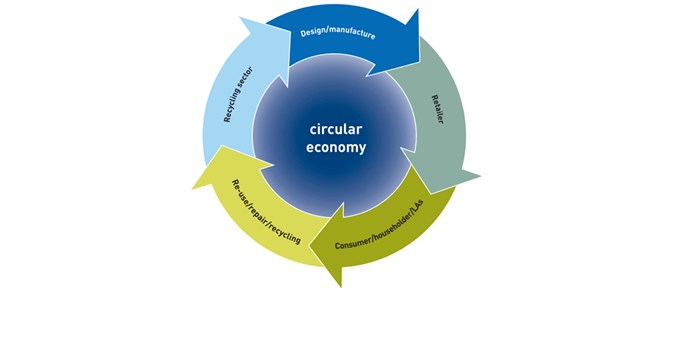The creative industries are key to building a circular economy which reduces waste and creates economic sustainability for brands - and marketers need to be brought on board to drive the process.

Source: Wrap.org.uk
An article in the UK’s The Guardian newspaper last week, asked this question in a headline: ‘Can the advertising industry sell us waste-free living?’ Since advertising agencies are “experts at changing human behaviour” we need them to sell the circular economy to marketers, according to an interview with WWF Earth Hour founder Andy Ridley, who has just taken over as CEO of Circular Economy, a Netherlands-based social enterprise.
Briefly, as defined by Wrap, “A circular economy is an alternative to a traditional linear economy (make, use, dispose), in which we keep resources in use for as long as possible, extract the maximum value from them whilst in use, then recover and regenerate products and materials at the end of each service life.”
And from the Ellen MacArthur Foundation: “A circular economy is one that is restorative and regenerative by design, and which aims to keep products, components and materials at their highest utility and value at all times, distinguishing between technical and biological cycles.”
The reason why a circular economy is so important, is quite simple, really. If we don’t change our consumption patterns, our grandchildren will need to look for another home, as our planet will be toast.
According to The Guardian article, Ridley now intends to build a global grassroots movement to accelerate the circular economy and is calling on the creative industry to help: “Marketeers are talented people, these are some of the most creative people on the planet. We need them to be part of this change.”
And he says the ad industry can help by starting to change the outlook of its corporate clients: “It’s about looking at circular economy business models, for example, closed loop recycling, asset sharing, switching to a service, and how you apply those to your client. Smart creatives will start to get that.”
The most important point about the circular economy, as The Guardian article is careful to point out, is that the circular economy is not asking us to “stop consuming, it’s saying we should start consuming differently”.
As Ridley tells The Guardian at the conclusion of the interview: “The advertising industry has been through these three big challenges: digital, data-driven and now the search for authenticity. [The circular economy] is the greatest opportunity for the ad industry in generations.”
Why should marketers care?
A circular economy makes economic sense as it does create opportunities for growth:
- It reduces waste throughout all of the life cycle of a product and the components that go into that product.
- It drives greater resource productivity.
- It retains more of the value of materials, energy, and the labour inputs that go into creating products.
- Addresses resource security and scarcity issues in the future.
- Reduces the environmental impact of product and consumption.
- It’s marketing friendly.
- Reduces exposure to resources risk in the supply chain.
Sources: Wrap; McKinsey.
Disruption is now a feature of every industry. And “disruptive innovation” is a prime enabler of the circular economy, as most businesses understand that if they don’t disrupt their own models, someone else will. So new models, new product ideas, new ways of doing business, new processes, collaboration, etc, are all being looked at.
But the fundamental reason a shift needs to happen from the current linear economy to a circular economy, is that the linear model will not continue to create value for brands as the resources and raw materials needed to sustain growth, are not going to be available in the future.
Dragon Rouge design and innovation consultancy believes that marketers are far more ready to move towards a circular economy model because it is an economic model, not just a social responsibility.
“The circular economy moves away from the planet-saving, community-enhancing rhetoric that is such a turn off for marketers and many businessmen and women. It states a clear, long-term business-led problem and poses a clear, long-term business-led answer. It turns costly, negative issues like waste, into positive, value-creating resources.”
Dragon Rouge emphasises on its blog that, “transforming consumption from a linear to circular economy cannot happen without an engaged, motivated and incentivised consumer. Should we fail to engage marketers and consumers, we risk looking back on the circular economy as an interesting tale in the story of sustainability. We need to appeal to the mainstream with the promise of convenience, status, health and affordability.”










































